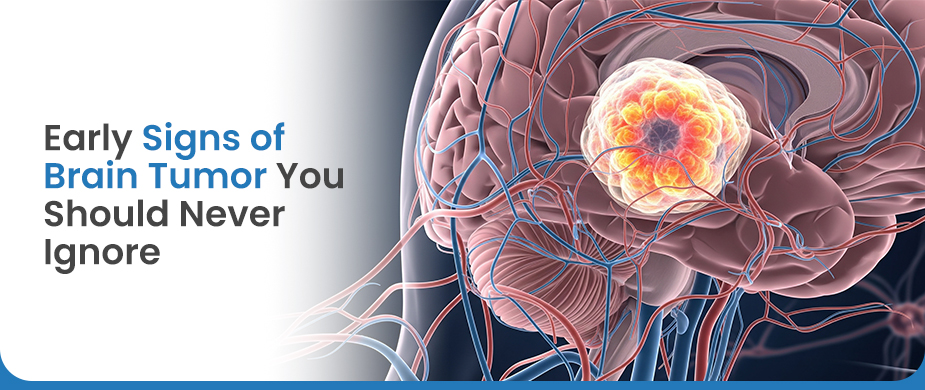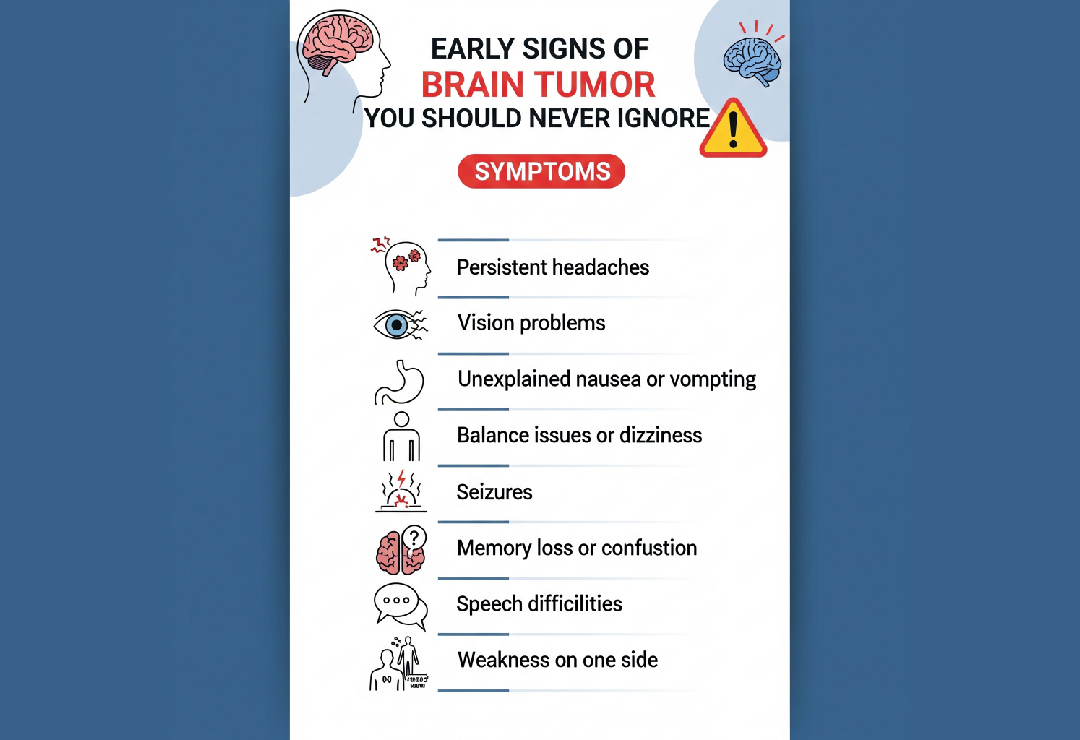
Book an Appointment
Call Us01140846835Early Signs of Brain Tumor You Should Never Ignore
The human brain is the command center for all that we do—thought, movement, sensation, and even emotion. When something abnormal begins to develop inside it, such as a brain tumor, the impact can be far-reaching and sometimes subtle in the beginning. Identifying the initial signs of a brain tumor may prove to be life-saving. While not all signs are necessarily cancer, some symptoms of brain tumor must never be ignored.
Brain tumors can occur at any age, but the symptoms often vary depending on the type, location, and size of the tumor. Early detection can lead to better outcomes, but because many of the symptoms can mimic more common and less serious conditions, they are often dismissed. That’s why knowing how to detect a brain tumor early is so important.
 What Is a Brain Tumor?
What Is a Brain Tumor?
A brain tumor is a growth of abnormal cells in or near the brain. They can be benign (not cancerous) or malignant (cancerous). Tumors may start in the brain (primary brain tumors) or may be metastatic (spread from cancers in other parts of the body) brain tumors.
Whether malignant or benign, a brain tumor can still cause serious symptoms by compressing or disrupting the function of essential brain tissues. Since it expands, it can cause increased pressure within the skull, and this can give rise to a broad range of symptoms that require immediate medical care.
Read Also: How Recovering from Brain Tumor Surgery
Why Early Detection Matters?
Identifying brain tumor signs early on can significantly enhance treatment choices and prognosis. Although some benign, slow-growing tumors may not require immediate surgery at the moment, malignant or fast-growing tumors tend to necessitate prompt attention. If signs of a brain tumor go unaddressed for an extended period can lead to permanent brain damage, disability, or even mortality.
Early imaging, medicare evaluation, and neurologist assessment can diagnose and treat brain tumors at an early stage, prior to their progression to create permanent damage.
Read Also: Understanding The Various Brain Tumor Causes
Common Early Signs of Brain Tumor You Should Never Ignore
Early detection of a brain tumor is difficult since most of the symptoms are non-specific. Below are some of the key symptoms of a brain tumor in adults that one should be concerned about:
1. Chronic Headaches That Worsen Over Time
Headaches are among the most frequent symptoms of brain tumors. Yet, all headaches do not imply a tumor. What characterizes a brain tumor headache from an ordinary one is its pattern and course.
Brain tumor headaches are usually:
- Worse in the morning and can become better during the day.
- More frequent and severe over time.
- Not responsive to typical headache medicines.
- May be preceded or followed by vomiting or nausea, especially upon waking.
These headaches are caused by the tumor increasing pressure within the skull or irritating nearby nerves are a frequent cause.
Read Also: How Much Does Brain Tumor Surgery Cost In India?
2. Seizures or Convulsions
Adult-onset seizures are one of the most significant warning signs of brain cancer. Seizures happen when unusual electrical activity in the brain is provoked. Tumors can disturb this activity by impacting good brain tissue.
There are various kinds of seizures, and they can manifest as:
- Arm or leg jerking.
- Loss of consciousness or awareness.
- Transitory confusion or stare spells.
- Tingling or twitching of the muscles.
An isolated unexplained seizure is enough to warrant immediate medical assessment and possibly a brain scan.
Read Also: 8 Silent Signs of Brain Tumor to Watch Out For
3. Changes in Vision
Tumors that compress the optic nerve or lie within the occipital lobe (the visual cortex of the brain) will produce any number of visual disturbances.
These can include:
- Blurred or double vision.
- Loss of peripheral vision (missing patches of your field of view).
- Seeing flashes of light or visual patterns.
- Sudden or progressive vision loss in one or both eyes.
Vision issues can develop gradually, so they're more difficult to notice. Having regular eye exams and being mindful of these changes can be important to detecting brain tumors early.
Read Also: 8 Silent Signs of Brain Tumor to Watch Out For
4. Nausea and Vomiting (Not Related to Digestion)
Repeated vomiting and nausea, which are unrelated to food or gastrointestinal problems, can result from heightened intracranial pressure due to a developing tumor.
This vomiting is typically:
- Occurs in the early morning.
- May be sudden and projectile.
- Occurs without stomach pain or other gastrointestinal symptoms.
If there is vomiting accompanied by other neurological signs such as dizziness or changes in vision, never ignore it.
Read Also: All you need to know about Deep Brain Stimulation
5. Unexplained Weakness or Numbness
The brain is responsible for all voluntary muscle movements. A tumor that is compressing motor regions can result in:
- Arms or legs weakness (usually one side of the body).
- Numbness or tingling.
- Clumsiness or loss of coordination.
- Difficulty in walking or balancing.
These neurological symptoms may also mimic a stroke, which also requires immediate attention.
6. Personality and Behavioral Changes
Abrupt mood, personality, or behavioral shifts—particularly when inexplicable—can signal a tumor on the frontal lobe or elsewhere in the brain that is responsible for emotion and decision-making.
The changes are likely to be:
- Heightened irritability or aggression.
- Impulsiveness or poor judgment.
- Apathy, depression, or anxiety.
- Inappropriate social conduct.
Symptoms can be mistaken for stress or mental health issues, so careful observation of duration and context is essential.
7. Cognitive Difficulties and Memory Loss
Since tumors involve various regions of the brain, they can disrupt memory, thinking, and concentration.
Some complaints are:
- Having trouble remembering words.
- Forgetting things in the short term.
- Having difficulty solving problems or multitasking.
- Easily being confused or distracted.
Such symptoms are sometimes elusive and develop slowly but are significant symptoms of a brain tumor that should be noted, particularly when happening in a person with no previous cognitive decline.
8. Hearing Difficulty or Tinnitus
Tumors close to the auditory nerve or brainstem may lead to:
- Sudden or progressive hearing loss in one ear.
- Tinnitus: a constant ringing or buzzing sound.
- A fullness sensation in the ears.
- Trouble with understanding speech, particularly in noisy places.
An audiologist might be the first to notice asymmetrical hearing loss—another potential early sign of a brain tumor.
9. Difficulty Speaking or Understanding Language
A brain tumor in the language areas, such as the left parietal or temporal lobe, may cause language problems.
These can manifest as:
- Difficulty in recalling proper words.
- Slurred speech.
- Difficulty in understanding others.
- Speaking nonsensical words or confusing words.
If a person exhibits these symptoms acutely or gradually, he or she should be examined immediately.
10. Loss of Coordination and Balance
The cerebellum is the region of the brain responsible for balance and coordination. Tumors in or close to this region can lead to:
Staggering or unsteady walking.
- Difficulty grasping small objects.
- Dizziness or vertigo.
- Increased frequency of falls.
Balance problems always need to be given serious attention, especially when accompanied by headaches or changes in vision.
When to See a Doctor
If you or someone you know is experiencing two or more of the symptoms mentioned above, especially if they’re persistent, worsening, or unexplained, seek medical attention promptly. Early intervention could mean the difference between managing a benign condition and catching a life-threatening tumor before it spreads.
Though most early symptoms of a brain tumor are similar to other disorders, better safe than sorry. Don't write off symptoms as stress, aging, or fatigue without a professional assessment.
Conclusion
Brain tumors are uncommon, but their implications are dire if dismissed. Getting to recognize the early warning signs of brain tumor and understanding which brain tumor symptoms to pay attention to can help ensure that no warning signs are missed. Whether it is seizures in adults, morning headaches that persist, or personality changes that are subtle, all these can be an indication that something more serious is occurring in the brain.
Knowing how to spot a brain tumor at an early stage doesn't make you alarmist—it makes you informed, aware, and proactive. An early diagnosis offers doctors more options for treatment and provides patients with a healthier chance at recovery.
If you notice any of these signs of brain cancer, don't wait. Believe your instincts, see a medical expert, and take the first step toward clarity, timely care, and peace of mind.
 By -Dr Aaksha Shukla |
July 19, 2025 | 9 Min Read
By -Dr Aaksha Shukla |
July 19, 2025 | 9 Min Read
Best Tips for Sports Injury Recovery
Guide to Stroke Prevention and Recovery
How to Manage Parkinson’s Symptoms Effectively
Traumatic Brain Injury: Symptoms, Causes, and Treatments
10 Superfoods That Boost Your Brain Power
10 Early Warning Signs of Brain Stroke Everyone Should Know
5 Most Common Sports Injuries and Their Quick Treatments
12 Everyday Habits That Damage Your Spine
Brain Stroke: Causes, Warning Signs & Emergency Treatment
10 Early Symptoms of Brain Tumor You Should Never Ignore
How to Choose the Right Neurosurgeon in Delhi NCR
How Stress Affects Brain Health: Neurological Insights
Early Signs of Spinal Disorders in Working Professionals
How Advanced Neurosurgery Is Saving Lives: A Look Inside IBS Hospitals
Epilepsy: Diagnosis and Treatment in Delhi
Stroke Recovery: How a Comprehensive Neuro Rehab Plan Makes the Difference
Benefits of Neuro-Navigation in Brain Surgery
Warning Signs Of Stroke You Should Never Ignore
Diagnosing Autism Spectrum Disorders Early: Why It Matters
Spine Surgery vs Physiotherapy: Which Is Better for Back Pain?

